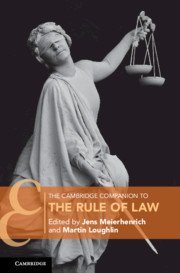Book contents
- The Cambridge Companion to the Rule of Law
- Cambridge Companions to Law
- The Cambridge Companion to the Rule of Law
- Copyright page
- Contents
- Contributors
- Part I Introduction
- Part II Histories
- 1 Classical Athens’ Radical Democratic “Rule of Law”
- 2 Rechtsstaat versus the Rule of Law
- 3 État de droit: The Gallicization of the Rechtsstaat
- 4 Islamic Conceptions of the Rule of Law
- 5 Empires and the Rule of Law: Arbitrary Justice and Imperial Legal Ordering
- Part III Moralities
- Part IV Pathologies
- Part V Trajectories
- Part VI Conclusion
- Bibliography
- Index
1 - Classical Athens’ Radical Democratic “Rule of Law”
from Part II - Histories
Published online by Cambridge University Press: 03 August 2021
- The Cambridge Companion to the Rule of Law
- Cambridge Companions to Law
- The Cambridge Companion to the Rule of Law
- Copyright page
- Contents
- Contributors
- Part I Introduction
- Part II Histories
- 1 Classical Athens’ Radical Democratic “Rule of Law”
- 2 Rechtsstaat versus the Rule of Law
- 3 État de droit: The Gallicization of the Rechtsstaat
- 4 Islamic Conceptions of the Rule of Law
- 5 Empires and the Rule of Law: Arbitrary Justice and Imperial Legal Ordering
- Part III Moralities
- Part IV Pathologies
- Part V Trajectories
- Part VI Conclusion
- Bibliography
- Index
Summary
Herodotus’ Persian debate – a fictional conversation between three noble Persians on the relative merits of rule by one, rule by the few, and rule by all – ironically provides one of our clearest statements of Greek democratic theory.1 In the debate, Otanes, arguing for rule by all, highlights what are recognizable as the key features of Athenian democracy: isonomia (equality under the law); selection of magistrates by lot; accountability for officials; and decision-making in a deliberative popular Assembly.
- Type
- Chapter
- Information
- The Cambridge Companion to the Rule of Law , pp. 25 - 38Publisher: Cambridge University PressPrint publication year: 2021
- 1
- Cited by

